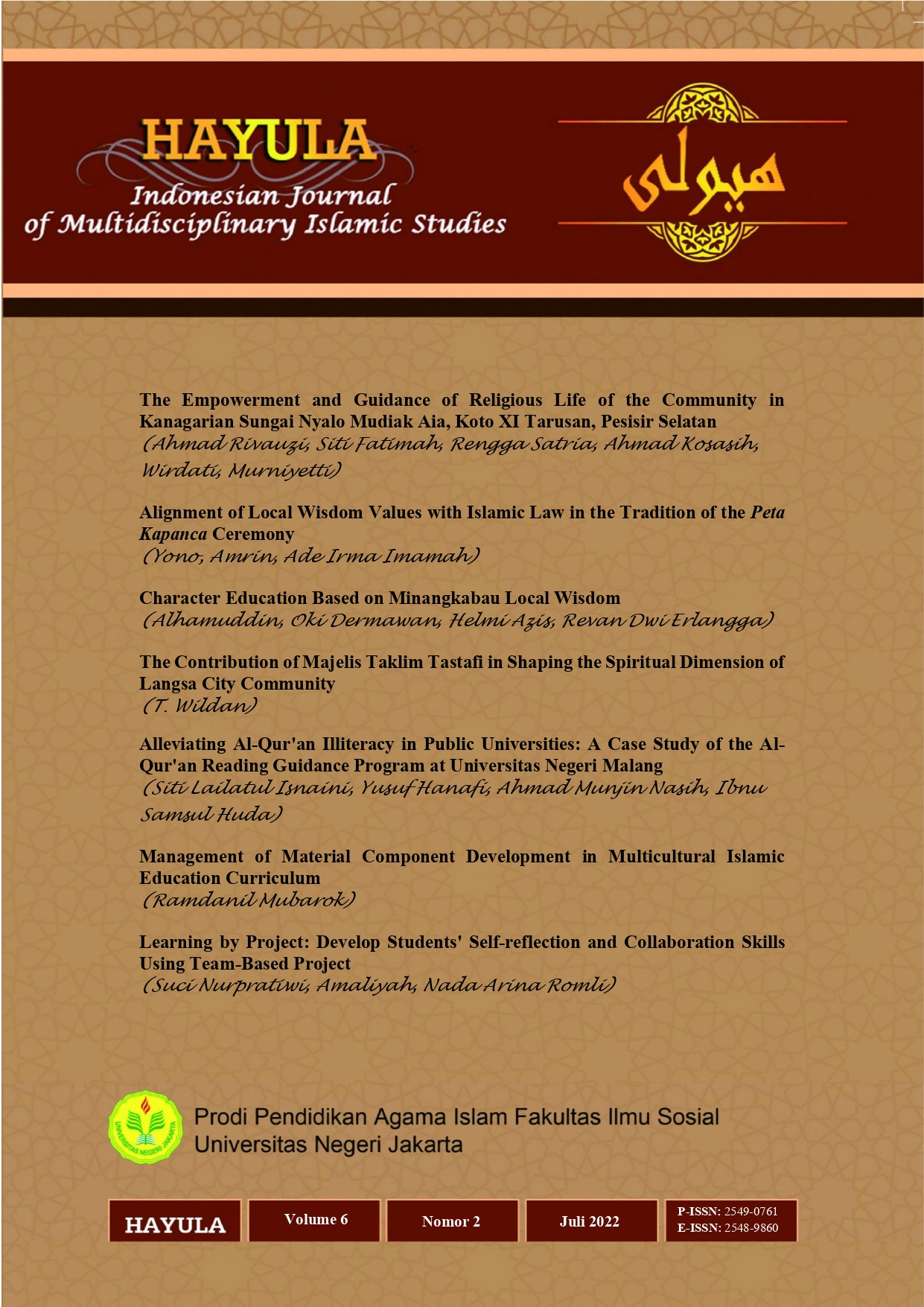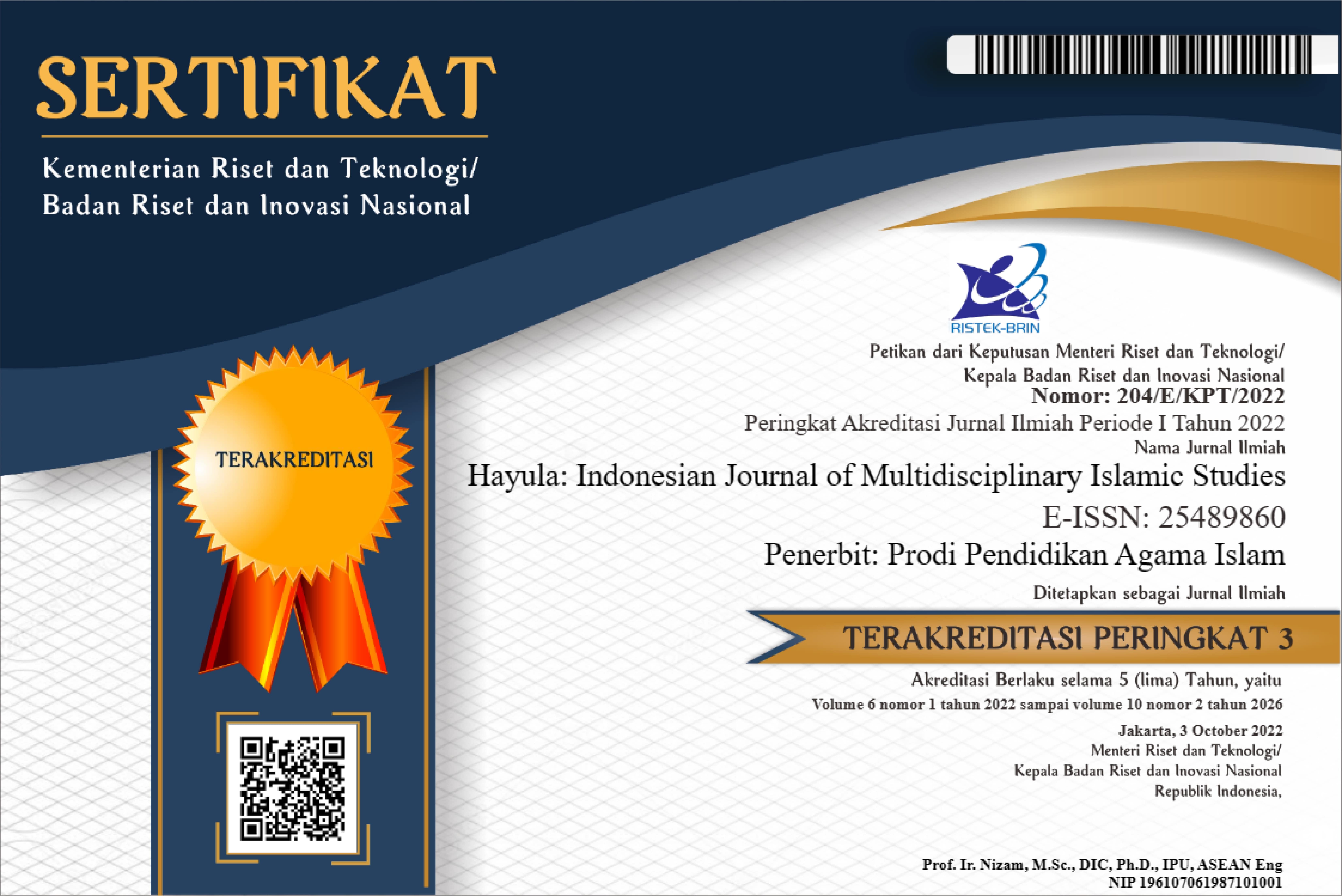Alleviating Al-Qur'an Illiteracy in Public Universities: A Case Study of the Al-Qur'an Reading Guidance Program at Universitas Negeri Malang
Studi Kasus Program Bimbingan Baca al-Qur’an di Universitas Negeri Malang
DOI:
https://doi.org/10.21009/hayula.006.02.05Keywords:
Islamic religious education, guidance on reading the Qur'an, eradicating illiteracy in the Qur'anAbstract
The competence of reading the holy book correctly and adequately is the obligation of every religious person. Ironically, many Muslim students do not have adequate skills in reading the Qur'an. Therefore, Universitas Negeri Malang (UM) launched a campaign to be free of Qur'an illiteracy for its students. This study aims to describe the planning, implementation, evaluation, and effectiveness of Qur'an learning at UM and the correlation of Arabic language skills to the ability to read the al-Qur'an. The method used is a mixed-method with an exploratory sequential design. The quantitative data analysis technique used normality test, Wilcoxon signed ranks, d-effect size, and calculation of N-gain value. The results of the study are as follows: (1) learning planning is carried out in a centralized and detailed manner; (2) the implementation of learning adapts to class groupings, and learning steps specified in the Qur'an Reading Guidance curriculum; (3) evaluation of learning is carried out using tashih techniques, post-test, and assessment of learning attitudes; (4) learning effectiveness is in the high category, which is indicated by the d-effect size value of 0.76, and (5) Arabic language ability is found to have a significant correlation with the ability to read the Qur'an. In general, UM is considered successful in reducing the level of Qur'an illiteracy among students.
References
Alhamuddin, A., Hamdani, F. F. R. S., Tandika, D., & Adwiyah, R. (2018). Developing Al-Quran Instruction Model Through 3A (Ajari Aku Al-Quran Or Please Teach Me Al-Quran) To Improve Students' Ability In Reading Al-Quran At Bandung Islamic University. International Journal of Education, 10(2). https://doi.org/10.17509/ije.v10i2.8536
Anggraeni, D., Hakam, A., Mardhiah, I., & Lubis, Z. (2019). Membangun Peradaban Bangsa Melalui Religiusitas Berbasis Budaya Lokal. Jurnal Studi Al-Qur'an, 15(1), 95-116.
Arafat, Y. (2020). Implementasi Metode Jibril dalam Meningkatkan Kemampuan Membaca Al Qur’an Kelas C2 Tahsin Tilawah Lembaga Takhassusul Qur’an Darul Hikmah. Jurnal at-Thiqah, 3(1), 16.
Creswell, J. W., & Clark, V. L. P. (2018). Designing and Conducting Mixed Methods Research (3rd ed.). SAGE Publications, Inc.
Efendi. (2019). Rekrutmen Tenaga Pendidik dalam Meningkatkan Kualitas di Sekolah Alam Raya Muara Jambi di Kabupaten Muaro Jambi. 115.
Febriyarni, B. (2019). Upaya Dosen Tahsin Al-Qiraah dalam Meningkatkan Kemampuan Membaca Al-Quran Mahasiswa Jurusan Syari’ah Institut Agama Islam Negeri Curup. FOKUS Jurnal Kajian Keislaman dan Kemasyarakatan, 3(2), 103. https://doi.org/10.29240/jf.v3i2.564
Hanafi, Y., Murtadho, N., Ikhsan, M. A., Diyana, T. N. & Sultoni, A. (2019). Student's and Instructor's Perception toward the Effectiveness of E-BBQ Enhanced Al-Qur'an Reading Ability. International Journal of Instruction. Vol. 12, No. 3, pp. 51-68. https://doi.org/10.29333/iji.2019.1234a
Hanafi, Y., Murtadho, N., Ikhsan, M. A., Saefi, M., & Diyana, T. N. (2019). Literasi Al-Qur’an: Model Pembelajaran Tahsin-Tilawah Berbasis Talqin-Taqlid. Sidoarjo: Delta Pijar Khatulistiwa.
Hanafi, Y., Murtadho, N., Ikhsan, M. A. & Diyana, T. N. (2020). Reinforcing Public University Student's Worship Education by Developing and Implementing Mobile-Learning Management System in the ADDIE Instructional Design Model. International Journal of Interactive Mobile Technologies. Vol 14, No 02, pp. 215-241.https://doi.org/10.3991/ijim.v14i02.11380
Hanafi, Y., Ikhsan, M.A., Saefi, M., Diyana, T.N. & Arifianto, M.L. (2021). Pendidikan Agama Islam di Masa Pandemi Covid-19: Tantangan dan Respons. Sidoarjo: Delta Pijar Khatulistiwa.
Hoyriah, U. (2020). PENGARUH KEMAMPUAN BAHASA ARAB TERHADAP KETERAMPILAN MENGHAFAL AL-QUR’AN DI PONDOK PESANTREN AHLUL QUR’AN PALEMBANG. Jurnal Lughoti: Jurnal Pendidikan Bahasa Arab, 2(1), 76–85.
Khadijah, S., & Rejeki, P. F. S. (2019). Efektivitas Komunikasi Tutor BTQ dan Kemampuan Membaca Al-Qur’an Mahasiswa. Jurnal Makna, 5(2), 25.
Kusumanto, I. (2020). Analisa Tingkat Pengetahuan Keislaman Dosen Fakultas Sains dan Teknologi UIN Suska Riau dalam Upaya Mewujudkan Integrasi Keislaman Menggunakan Metode Analytical Hierarchy Process (Ahp). Jurnal Teknik Industri: Jurnal Hasil Penelitian dan Karya Ilmiah dalam Bidang Teknik Industri, 5(1), 73. https://doi.org/10.24014/jti.v5i1.8977
Masduki, Y. (2018). Implikasi Psikologis Bagi Penghafal Al-Qur’an. Medina-Te : Jurnal Studi Islam, 18(1), 18–35. https://doi.org/10.19109/medinate.v14i1.2362
Maskur, M. (2019). Seni Baca Al-Quran: Metode Efektif dalam Pembelajaran Al-Quran Hadits. QUALITY: Journal of Empirical Research in Islamic Education, 7(2), 100. https://doi.org/10.21043/quality.v7i2.5783
Miles, M. B., Huberman, A. M., & Saldaña, J. (2014). Qualitative data analysis: a methods sourcebook (Third edition). SAGE Publications, Inc.
Munthe, A. P., & Naibaho, H. P. (2019). Manfaat dan Kendala Penerapan Tutor Sebaya untuk Siswa Kelas IV Sekolah Dasar Lentera Harapan Mamit. Jurnal Pendidikan dan Kebudayaan, 9(2), 10.
Morgan, G. A., Barrett, K. C., Leech, N. L., & Gloeckner, G. W. (2011). IBM SPSS for Introductory Statistics: Use and Interpretation (4th ed.). New York: Routledge, Taylor and Francis Group, LLC. https://doi.org/10.4324/9780429287657
Nuha, M. M. (2015). Studi Korelasi Antara Penguasaan Pelajaran Bahasa Arab dengan Kemampuan Membaca Al-Qur’an Siswa MI Matholiunnajah Sinanggul Kec. Mlonggo Kab. Jepara Tahun Pelajaran 2014/2015. Universitas Islam Negeri Walisongo.
Nuriyah, N. (2014). Evaluasi Pembelajaran: Studi Kajian Teori. Jurnal Eueksos (The Journal of Social and Economics Education), 3(1), 73–86.
Pratama, M. G. (2020). Efektivitas Penggunaan Metode Drill dalam Pembelajaran Al-Quran Hadits. 7.
Putra, P., & Syafrudin, S. (2020). Scramble Learning Model to Improve the Ability Reading the Quran in Elementary School/Model Pembelajaran Scramble untuk Meningkatkan Kemampuan Membaca Al-Quran pada Mata Pelajaran Al-Quran Hadits di Madrasah Ibtidaiyah. journal AL-MUDARRIS, 3(1), 26. https://doi.org/10.32478/al-mudarris.v3i1.332
Rahmi, N. (2017). Relevansi Kurikulum dan Wujud Kongkret Tujuan Pembelajaran Bahasa Arab. An Nabighoh Jurnal Pendidikan dan Pembelajaran Bahasa Arab, 19(1), 107. https://doi.org/10.32332/an-nabighoh.v19i1.760
Rumainur, R. (2019). Efektivitas Metode at-Tartil dalam Pembelajaran Tahsin al-Qur’an Mahasiswa Perguruan Tinggi Keagamaan Islam di Kalimantan Timur. FENOMENA, 11(1), 1–10. https://doi.org/10.21093/fj.v11i1.1403
Ruslandi, R., & Rochman, C. (2020). Peningkatan Kemampuan Membaca Al-Qur’an dengan Menggunakan Metode Iqra’ (Kelas V di SDN 262 Panyileukan Kota Bandung). Muaddib : Studi Kependidikan dan Keislaman, 1(1), 13. https://doi.org/10.24269/muaddib.v1i1.1732
Sauri, S., Amri, N., Jumadi, A., Najwa, S., Hapsah, S., & Sakrani, A. (2021). Implementasi Metode Iqra’ dalam Pembelajaran Membaca Al Quran di TPQ Dusun Lelonggek Desa Suntalangu. Jurnal Pengabdian Kepada Masyarakat, 1(1), 7.
Sholihin, M. N. (2020). Peran Ilmu Al-Ashwat dalam Pelafalan Huruf Hijaiyah (Kajian Teoritik Linguistik Terapan). Saliha: Jurnal Pendidikan Dan Agama Islam, 3(2), 110–127.
Supriyadi, T., Julia, J., & Iswara, P. D. (2019). Phonological Interference in Reciting Al-Qur'an: A Critical Reflection on the Learning of Al-Qur'an Phonology through Action Research. International Journal of Learning, Teaching and Educational Research, 18(9), 46–77. https://doi.org/10.26803/ijlter.18.9.3
Sutopo, & Waldrip, B. (2014). Impact Of A Representational Approach On Students' Reasoning And Conceptual Understanding In Learning Mechanics. International Journal of Science and Mathematics Education, 12(4), 741–765. https://doi.org/10.1007/s10763-013-9431-y
Taqo Sidqi, K. Z. (2018). Program Bimbingan Baca Tulis Al Qur’an Bagi Anak Berkebutuhan Khusus (Autis) DI SD Al Azzam Ketileng Semarang. SOSIO DIALEKTIKA, 3(1). https://doi.org/10.31942/sd.v3i1.2197
Umar, D. M., & Ismail, D. F. (2020). (Konsep Dasar bagi Mahasiswa Perguruan Tinggi Umum). Banyumas: CV. Pena Persada.
Downloads
Published
How to Cite
Issue
Section
License
Authors who publish with this Journal agree to the following terms:
- Author retain copyright and grant the journal right of first publication with the work simultaneously licensed under a creative commons attribution licensethat allow others to share the work within an acknowledgement of the work’s authorship and initial publication of this journal.
- Authors are able to enter into separate, additional contractual arrangementfor the non-exclusive distribution of the journal’s published version of the work (e.g. acknowledgement of its initial publication in this journal).
- Authors are permitted and encouraged to post their work online(e.g. in institutional repositories or on their websites) prior to and during the submission process, as it can lead to productive exchanges, as well as earlier and greater citation of published works.
Users/public use of this website will be licensed to CC BY







